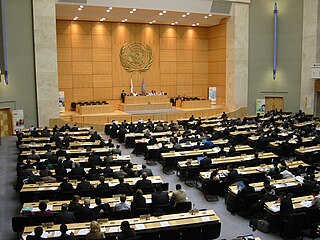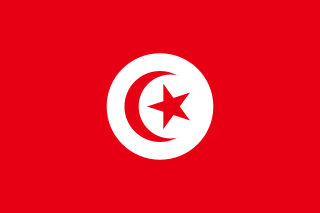
Tunisia (officially the Republic of Tunisia) is a country in the Maghreb region of North Africa, covering 165,000 square kilometres. Its northernmost point, Cape Angela, is the northernmost point on the African continent. It is bordered by Algeria to the west and southwest, Libya to the southeast, and the Mediterranean Sea to the north and east. Tunisia's population was 11.435 million in 2017. Tunisia's name is derived from its capital city, Tunis, which is located on its northeast coast.
Telecommunications in Tunisia includes telephones, radio, television, and the Internet. The Ministry of Communication Technologies, a cabinet-level governmental agency, is in charge of organizing the sector.

The World Summit on the Information Society (WSIS) was a two-phase United Nations-sponsored summit on information, communication and, in broad terms, the information society that took place in 2003 in Geneva and in 2005 in Tunis. One of its chief aims was to bridge the global digital divide separating rich countries from poor countries by spreading access to the Internet in the developing world. The conferences established 17 May as World Information Society Day.

Zine El Abidine Ben Ali, commonly known as Ben Ali, is a Tunisian former politician who served as President of Tunisia from 1987 until his ousting in 2011. Ben Ali was appointed Prime Minister in October 1987, and he assumed the Presidency on 7 November 1987 in a bloodless coup d'état that ousted President Habib Bourguiba, who was declared incompetent. Ben Ali was subsequently reelected with enormous majorities, each time exceeding 90% of the vote; the final re-election was on 25 October 2009.
The Sixth Tunisia Plan was an economic development plan implemented by the government of President Habib Bourguiba from 1982 to 1986.
The Seventh Tunisia Plan was an economic development plan implemented by the government of Tunisia from 1986 to 1990.
The Fifth Tunisia Plan was an economic development plan implemented by the government of Tunisia from 1977 to 1981.
The Second Tunisia Plan was an economic development plan implemented by the government of President Habib Bourguiba from 1965 to 1968.

Tunisia – United States relations are bilateral relations between Tunisia and the United States.

The following outline is provided as an overview of and topical guide to Tunisia:

Tourism in Tunisia is an industry that generates around 8 million arrivals per year, which makes the country among the ones that attract the most tourists in Africa. Tunisia has been an attractive destination for tourists since the beginning of the 1960s. Among Tunisia's tourist attractions are its cosmopolitan capital city of Tunis, the ancient ruins of Carthage, the Muslim and Jewish quarters of Jerba, and coastal resorts outside Monastir. According to The New York Times, Tunisia is "known for its golden beaches, sunny weather and affordable luxuries."

Russia–Tunisia relations (Arabic: العلاقات التونسية الروسية) are foreign relations between Russia and Tunisia. Both countries had established diplomatic relations in 1956, when Tunisia got its independence. Russia has an embassy in Tunis, and Tunisia has an embassy in Moscow.

Tunisia has achieved the highest access rates to water supply and sanitation services among the Middle East and North Africa. As of 2011, access to safe drinking water became close to universal approaching 100% in urban areas and 90% in rural areas. Tunisia provides good quality drinking water throughout the year.

The French protectorate of Tunisia was established in 1881, during the French colonial Empire era, and lasted until Tunisian independence in 1956.

The Tunisian Revolution was an intensive campaign of civil resistance. It included a series of street demonstrations which took place in Tunisia, and led to the ousting of longtime president Zine El Abidine Ben Ali in January 2011. It eventually led to a thorough democratization of the country and to free and democratic elections.
The international reactions to the Tunisian Revolution were generally supportive of the Tunisian people's right to protest, though several governments continued to voice support for President Zine El Abidine Ben Ali up to and even after his government's largely peaceful overthrow in January 2011.

On 26 June 2015, a mass shooting occurred at the tourist resort at Port El Kantaoui, about 10 kilometres north of the city of Sousse, Tunisia.












